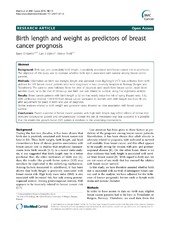Birth length and weight as predictors of breast cancer prognosis
Peer reviewed, Journal article
Published version
Permanent lenke
https://hdl.handle.net/1956/4693Utgivelsesdato
2010-03-26Metadata
Vis full innførselSamlinger
Originalversjon
https://doi.org/10.1186/1471-2407-10-115Sammendrag
Background Birth size, and particularly birth length, is positively associated with breast cancer risk in adulthood. The objective of this study was to examine whether birth size is associated with survival among breast cancer patients. Methods Information on birth size (weight, length and ponderal index (kg/length (m3)) was collected from birth archives for 331 breast cancer patients who were diagnosed at two university hospitals in Norway (Bergen and Trondheim). The patients were followed from the time of diagnosis until death from breast cancer, death from another cause, or to the end of follow-up, and birth size was related to survival, using Cox regression analysis. Results Breast cancer patients with birth length ≥ 52 cm had nearly twice the risk of dying (hazard ratio, 1.92, 95% confidence interval, 1.09-3.41) from breast cancer compared to women with birth length less than 48 cm, after adjustment for place of birth and year of diagnosis. Similar analyses related to birth weight and ponderal index showed no clear association with breast cancer survival. Conclusions Poorer outcome of breast cancer patients with high birth length may reflect effects of factors that stimulate longitudinal growth and simultaneously increase the risk of metastases and fatal outcome. It is possible that the insulin-like growth factor (IGF) system is involved in the underlying mechanisms.
Utgiver
BioMed CentralOpphavsrett
Mæhle et al.Copyright 2010 Mæhle et al; licensee BioMed Central Ltd.

